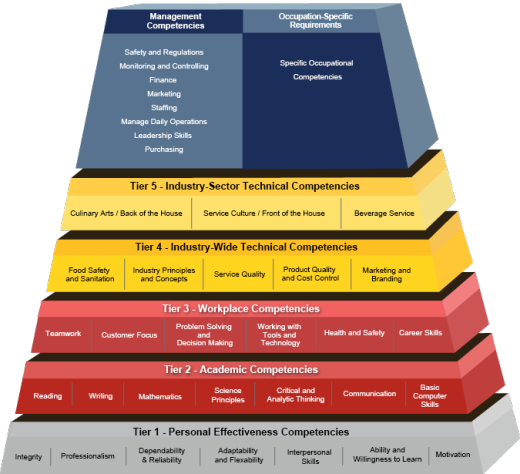This post brought to you by National Restaurant Association Educational Foundation . The content and opinions expressed below are that of upstartHR.
Over the past few months we have discussed restaurant skills and the impact they can have on someone’s long-term career options. We have also covered some amazing topics within the restaurant industry, and I hope you have learned as much as I have about the variety of career opportunities available. Today we are going to take a slightly more scientific look at those skills, but stick with me, because this is great information.
 Food and Beverage Service Competency Model
If you’re not aware, a competency model is a tool that defines the key KSA’s (knowledge, skills, and abilities) required to perform a job successfully. The rest of this post is built on that foundation, so it’s important that you understand the relevance of that. Competency models are powerful things, because we can use them to hire, train, and manage employees with a purpose and a plan (instead of merely guessing at the restaurant skills our staff need).
The National Restaurant Association Educational Foundation (NRAEF) developed the Food and Beverage Service Competency Model, a model geared specifically toward the restaurant industry. Now, if you’re anything like me, you probably had an initial thought of “Seriously? How complex can it be?” Don’t worry, it can be as complex or as simple as you’d like, depending on the career level/position you’re targeting. Check it out:

What it Tells Us about Key Restaurant Skills
The NRAEF recently released Who Works in the U.S. Restaurant Industry, a comprehensive research report about career opportunity in the restaurant and food service industry. The Competency Model compliments this research by providing incumbent workers, job seekers and influencers with a clear understanding of how best to enter, advance and ultimately succeed in the restaurant and food service sector.
The restaurant industry trains America’s workforce, offering one in three Americans their first job. The skills learned and developed within the industry are empowering employees to advance within the restaurant industry or find success in other industries. diverse, ranging from employability to technical and business leadership skills.
NRAEF’s main objective when developing the model was to create a state-of-the-art, industry-specific model that charts the pathways to career success afforded by the industry. The Model serves as a guide to help inform the industry’s workforce development, training and certification standards and approaches, as well as those of industry employers, educators and the public workforce investment system.
What I’d Like to Know
Statistically, many of you reading this have some sort of experience relating to the food service industry. I’d like to hear about any restaurant skills (check out the competency model above for ideas) that you might have picked up that have served you over the course of your career, whether you’re still in the restaurant field or not.
Leave a Reply
You must be logged in to post a comment.